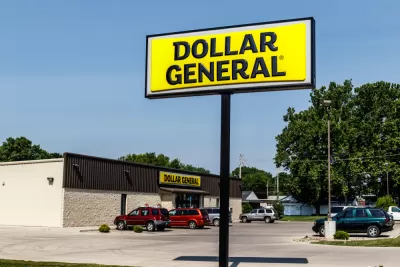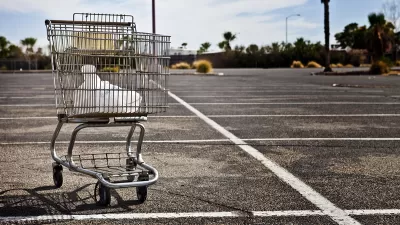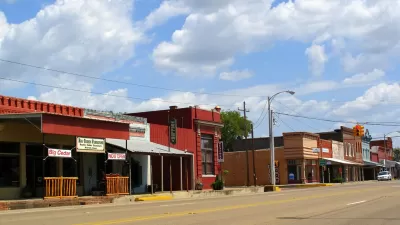Restrictions in North Tulsa are part of a backlash against the dollar stores flooding communities that are food deserts in need of real grocery stores.

Victor Luckerson writes about a law in Tulsa, Oklahoma that would curb the spread of dollar stores. The problem is especially acute in North Tulsa, which has nine dollar stores but not a single grocery store. The landscape has changed dramatically for an area once home to a thriving African American neighborhood filled with small businesses, known as Black Wall Street.
Starting in the late 1960s, Walmart lead to the demise of these businesses, along with the grocery stores that came later. Dollar stores came to North Tulsa to fill the void, as they have in communities across the country. And while these stores offer cheap products, they are not providing access to the healthy, fresh foods that residents need.
"The chains draw an ever-growing percentage of their sales from food, much of it high in calories and low in nutrients, like the Doritos in the central aisle at the store on Pine Street [in North Tulsa]. Stores that were once conveniences are now the only places to buy food in some communities," says Luckerson.
The efforts of a city councilperson representing North Tulsa resulted in a six-month moratorium on the construction of dollar stores in 2017. "In April 2018, the Council went further, requiring 'small-box' discount retailers in most of Ms. [Vanessa] Hall-Harper’s district to be built at least a mile apart, unless they carry at least 500 square feet of fresh fruits, vegetables and meats," writes Luckerson.
Other cities are looking to the Tulsa law as a model for taking back control of their economic development futures. And Luckerson says what is happening around dollar stores is part of a larger phenomenon of city leaders "pushing back against America’s winner-take-all economy — from New York City’s protests against Amazon to new laws in California and Boston limiting the expansion of app-based services like Uber and Airbnb."
FULL STORY: How a City Fought Runaway Capitalism and Won

Planetizen Federal Action Tracker
A weekly monitor of how Trump’s orders and actions are impacting planners and planning in America.

Congressman Proposes Bill to Rename DC Metro “Trump Train”
The Make Autorail Great Again Act would withhold federal funding to the system until the Washington Metropolitan Area Transit Authority (WMATA), rebrands as the Washington Metropolitan Authority for Greater Access (WMAGA).

DARTSpace Platform Streamlines Dallas TOD Application Process
The Dallas transit agency hopes a shorter permitting timeline will boost transit-oriented development around rail stations.

Parks: Essential Community Infrastructure — and a Smart Investment
Even during times of budget constraint, continued investment in parks is critical, as they provide proven benefits to public health, safety, climate resilience, and community well-being — particularly for under-resourced communities.

Porches, Pets, and the People We Grow Old With
Neighborhood connections and animal companions matter to aging with dignity, and how we build can support them. Here’s a human-scale proposal for aging in place.

Single-Stair Design Contest Envisions Human-Scale Buildings
Single-stair building construction is having a resurgence in the United States, where, for the last several decades, zoning codes have required more than one staircase in multi-story housing developments.
Urban Design for Planners 1: Software Tools
This six-course series explores essential urban design concepts using open source software and equips planners with the tools they need to participate fully in the urban design process.
Planning for Universal Design
Learn the tools for implementing Universal Design in planning regulations.
City of Charlotte
Municipality of Princeton
City of Camden Redevelopment Agency
City of Astoria
Transportation Research & Education Center (TREC) at Portland State University
US High Speed Rail Association
City of Camden Redevelopment Agency
Municipality of Princeton (NJ)





























